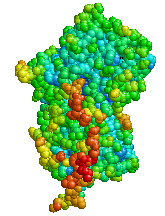
Photo from wikipedia
ABSTRACT Introduction Alpha1 antitrypsin deficiency (AATD), a common hereditary disorder affecting mainly lungs, liver and skin has been the focus of some of the most exciting therapeutic approaches in medicine… Click to show full abstract
ABSTRACT Introduction Alpha1 antitrypsin deficiency (AATD), a common hereditary disorder affecting mainly lungs, liver and skin has been the focus of some of the most exciting therapeutic approaches in medicine in the past 5 years. In this review, we discuss the therapies presently available for the different manifestations of AATD and new therapies in the pipeline. Areas covered We review therapeutic options for the individual lung, liver and skin manifestations of AATD along with approaches which aim to treat all three. Along with this renewed interest in treating AATD come challenges. How is AAT best delivered to the lung? What is the desired level of AAT in the circulation and lungs which therapeutics should aim to provide? Will treating the liver disease increase the potential for lung disease? Are there treatments to target the underlying genetic defect with the potential to prevent all aspects of AATDrelated disease? Expert opinion With a relatively small population able to participate in clinical studies, increased awareness and diagnosis of AATD is urgently needed. Better, more sensitive clinical parameters will assist in the generation of acceptable and robust evidence of therapeutic effect for current and emerging treatments.
Journal Title: Expert Review of Respiratory Medicine
Year Published: 2023
Link to full text (if available)
Share on Social Media: Sign Up to like & get
recommendations!